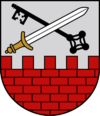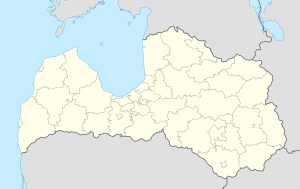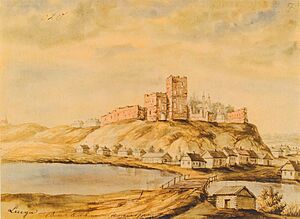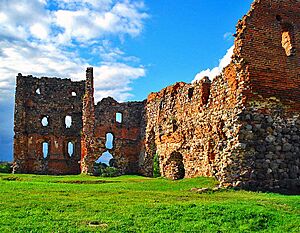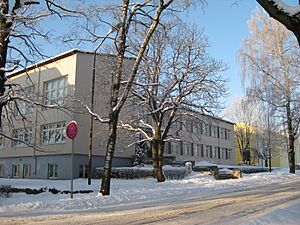Ludza facts for kids
Quick facts for kids
Ludza
|
||
|---|---|---|
|
Town
|
||
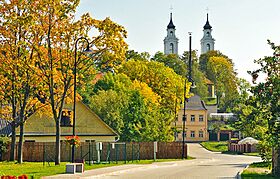
Ludza skyline
|
||
|
||
| Country | ||
| Municipality | Ludza Municipality | |
| Town rights | 1177 | |
| Area | ||
| • Total | Lua error in Module:Wd at line 1,575: attempt to index field 'wikibase' (a nil value). km2 (Formatting error: invalid input when rounding sq mi) | |
| • Land | Lua error in Module:Wd at line 1,575: attempt to index field 'wikibase' (a nil value). km2 (Formatting error: invalid input when rounding sq mi) | |
| • Water | Expression error: Unexpected < operator. km2 (Formatting error: invalid input when rounding sq mi) | |
| Population | ||
| • Total | Lua error in Module:Wd at line 1,575: attempt to index field 'wikibase' (a nil value). | |
| Time zone | UTC+2 (EET) | |
| • Summer (DST) | UTC+3 (EEST) | |
| Postal code |
LV-570(1-2)
|
|
| Calling code | +371 657 | |
| Number of Municipality council members | 15 | |
| Website | ludza.lv | |
Ludza is a town located in the Latgale region of eastern Latvia. It is known as the oldest town in Latvia. A key on its coat of arms celebrates this long history. Ludza is also the main town of Ludza Municipality, which is close to the Russian border. In 2020, about 7,667 people lived there.
Contents
History of Ludza
Ludza was first mentioned in old writings around 1173 or 1177. This makes it one of the oldest settlements in the region. In 1399, the Livonian Order built a strong stone fortress here. This fortress was built on top of an even older local fortress. It served as an important eastern outpost for Livonia. Today, you can still visit the ruins of Ludza Castle.
Ludza in the Polish-Lithuanian Commonwealth
After the Livonian Order ended in 1561, Ludza became part of the Polish–Lithuanian Commonwealth. It was then part of the Wenden Voivodeship. In January 1626, during a war with Sweden, Ludza was taken by Sweden. Later, Polish forces took it back.
In 1678, a special group was formed to build Catholic churches in Latgale. They visited Ludza, and a new church was finished in 1687. Sadly, this church was destroyed by fire in 1736.
Ludza in the Russian Empire
In 1772, Ludza became part of the Russian Empire. This happened after the first division of Poland. In 1777, Catherine II of Russia officially gave Ludza the rights of a town. During the early 1800s, many people living in Ludza were Jews. In 1815, about 67% of the population was Jewish, and there were seven synagogues in the town.
Ludza in Modern Latvia
After the Latvian–Soviet Peace Treaty in 1920, Ludza became part of the new Republic of Latvia. It was the main town of the Ludza district.
During World War II, German forces occupied Ludza from July 4, 1941, to July 23, 1944. During this time, the Jewish people were forced to live in a special area called a ghetto. Many Jewish residents faced terrible violence and were killed.
After Latvia became independent again in 1991, Ludza continued to be an important administrative center. In 2009, it became the center of the new Ludza Municipality.
Things to See and Do in Ludza
Ludza has many interesting places to visit. The Ludza Museum and Tourism Information Centre can help you explore the town. Some of the most popular sights include:
- The Ludza History Museum, which has outdoor exhibits.
- The beautiful Roman Catholic Church.
- The historic Orthodox Church.
- The Evangelical Lutheran Church.
- The Old Believers' Church.
- The ruins of the medieval Ludza Castle.
- The Ludza Craftsmen Centre, where you can see local crafts.
There are also several lakes around Ludza. These lakes are great for fishing and water activities.
Getting Around Ludza
Roads in Ludza
Ludza is located on a major road that connects Riga and Moscow. This road is also part of European route E22. The town is only about 30 kilometers (18.6 miles) from the Latvian-Russian border.
Railway in Ludza
The Ludza Train Station is part of a railway line that goes from Rēzekne to Zilupe. This railway was first built in 1901. It was part of a larger line connecting Ventspils to Moscow. The current station building was built after World War II.
Education in Ludza
Children in Ludza have many options for their education. There are three pre-school institutions: "Rūķītis", "Pasaciņa", and "Namiņš". For elementary and secondary school, students can attend Ludza Gymnasium or Ludza Secondary School #2. There is also Ludza Evening Secondary School.
Beyond regular school, kids can join various activities at:
- Ludza Music Primary School, which combines music lessons with primary education.
- Ludza Art School.
- Ludza Children and Youth Centre.
- Ludza Sport School.
People of Ludza
As of 2020, Ludza had a population of 7,667 people. Most residents are Latvians (58.1%). The next largest group is Russians (34.7%). Other groups include Belarusians, Ukrainians, Poles, and Lithuanians.
Famous People Born in Ludza
Many notable people were born in Ludza, including:
- Yakov Kulnev (1763–1812) – A major-general and a hero of the war against Napoleon.
- Ferdynand Antoni Ossendowski (1878—1945) – A Polish writer and explorer.
- Karol Bohdanowicz (1864–1947) – A Polish geologist.
- Leonid Dobychin (1894–1936) – A Russian writer.
- Ilya Chashnik (1902–1929) – A Russian suprematist painter.
- Stanislaus Ladusãns (1912-1993) – A Jesuit priest.
Ludza's International Friends
Ludza municipality works with several towns and cities in other countries. These cooperation partners include:
- Bad Bodenteich (Germany)
- Hlybokaye (Belarus)
- Brest (Belarus)
- Nevel (Russia)
- Sebezh (Russia)
- Novopolotsk (Belarus)
See also
 In Spanish: Ludza para niños
In Spanish: Ludza para niños
 | Lonnie Johnson |
 | Granville Woods |
 | Lewis Howard Latimer |
 | James West |


